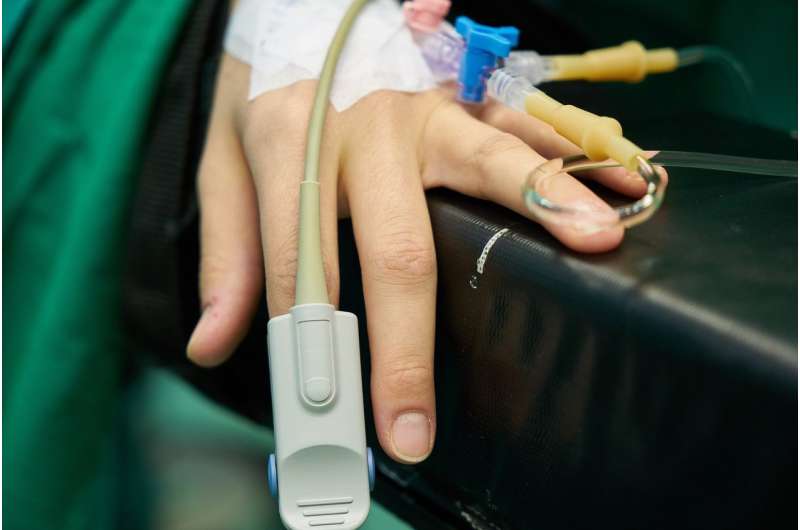Erlotinib improves progression-free survival in early mutated non-small cell lung cancer

Neoadjuvant erlotinib benefits selected epidermal growth factor receptor (EGFR)-mutated patients who undergo complete resection of stage IIIA-N2 stage non-small cell lung cancer(NSCLC), shows a randomised study comparing erlotinib with gemcitabine plus cisplatin as neoadjuvant treatment, presented at the ESMO 2018 Congress in Munich.
"Our results suggest promise for the use of biomarker-guided neoadjuvant EGFR-tyrosine kinase inhibitor (TKI) treatment strategies in stage IIIA-N2 non-small cell lung cancer,' said Dr. Yi-Long Wu, Tenured Professor of Guangdong Lung Cancer Institute, Guangzhou, China who is the principal investigator of the CTONG 1103 study.
"This is the first study to demonstrate progression-free survival (PFS) superiority for erlotinib over gemcitabine plus cisplatin chemotherapy in the neoadjuvant/adjuvant setting of stage IIIA-N2 EGFR mutated NSCLC," added Wu.
Results showed that a total of 386 patients from 17 centres in China were screened, and 72 were randomised 1:1 to therapy and included in the intention-to-treat population. The objective response rate (ORR) for neoadjuvant erlotinib versus gemcitabine plus cisplatin chemotherapy was 54.1 percent (95 percent CI: 37.2 percent to 70.9 percent) versus 34.3 percent (95 percent CI: 17.7 percent to 50.8 percent) with an odds ratio of 2.26 (95 percent CI: 0.87–5.84;p=0.092). After neoadjuvant therapy, 83.8 percent of patients in the erlotinib group and 68·6 percent in the gemcitabine plus cisplatin group underwent surgery.
Median progression-free survival (PFS) was significantly longer with erlotinib at 21·5 months (95 percent CI: 19.3–23.6) versus gemcitabine plus cisplatin chemotherapy at 11.9 months (95 percent CI: 9.1–14.7) with a hazard ratio of 0.42 (95 percent CI: 0.23–0.76; p=00003). Overall survival is too immature to report, said Dr. Wu.
Current treatment strategies for resected stage IIIA-N2 EGFR mutated NSCLC is controversial, explained Dr. Wu, but he added that EGFR-TKIs have been shown to improve the prognosis of patients with advanced EGFR-mutant NSCLC.
"Cisplatin-based doublet chemotherapy as neoadjuvant treatment for stage IIIA-N2 NSCLC only gives patients 5 percent five-year overall survival benefit," said Dr. Wu, explaining the unmet medical need in this patient population. "Recently, the CTONG 1104 trial showed for the first time that adjuvant EGFR-TKI gefitinib could improve disease free survival (DFS) by 10 months compared to adjuvant chemotherapy (28.7 months vs 18.0 months) in N1N2 resected NSCLC. This raises the possibility that EGFR-TKIs may play a beneficial role in the neoadjuvant setting for this subgroup."
Grade 3 and 4 toxicities were fewer in the erlotinib arm (0 percent) compared to the gemcitabine plus cisplatin arm (29.4 percent).
Commenting on the study for ESMO, Tony Mok, Professor of Clinical Oncology, the Chinese University of Hong Kong, said that this was a long-awaited study on patients with EGFR mutation positive stage IIIA NSCLC. "It has always been tempting to offer neo-adjuvant EGFR TKI to downstage the patient for surgery, but the action stops short in absence of supporting evidence."
"This randomised study is the first to demonstrate improvement in multiple parameters including tumour response rate, resection rate, major pathologic response and PFS with the use of neoadjuvant EGFR TKI followed by adjuvant TKI," he pointed out. He added that, "While the difference between EGFR TKI and chemotherapy is significant, the impact of neoadjuvant EGFR TKI is relatively disappointing. Response rate of 54 percent is lower than what is expected of TKI in stage IV disease (about 70 percent), and only 13 percent of patients had attained major pathologic response. The reason for this is unclear, but one may have to query if duration of neoadjuvant EGFR TKI for 42 days is sufficient. Overall, this important study offers us the rationale to consider neo-adjuvant EGFR TKI. "
More information: Abstract LBA48_PR '"CTONG 1103: Erlotinib versus Gemcitabine plus Cisplatin as Neo-adjuvant Treatment for Stage IIIA –N2 EGFR-mutation Non-small-cell lung cancer (EMERGING): a Randomised Study" will be presented by Wen-Zhao Zhong during the Proffered Paper Session on Sunday, 21 October, 09:45 to 10:45 (CEST) in Hall A1—Room 17. Annals of Oncology, Volume 29 Supplement 8 October 2018
Zhong WZ, Wang Q, et al. Gefitinib versus vinorelbine plus cisplatin as adjuvant treatment for stage II-IIIA (N1-N2) EGFR-mutant NSCLC (ADJUVANT/CTONG1104): a randomised, open-label, phase 3 study. Lancet Oncol. 2018 Jan;19(1):139-148.















